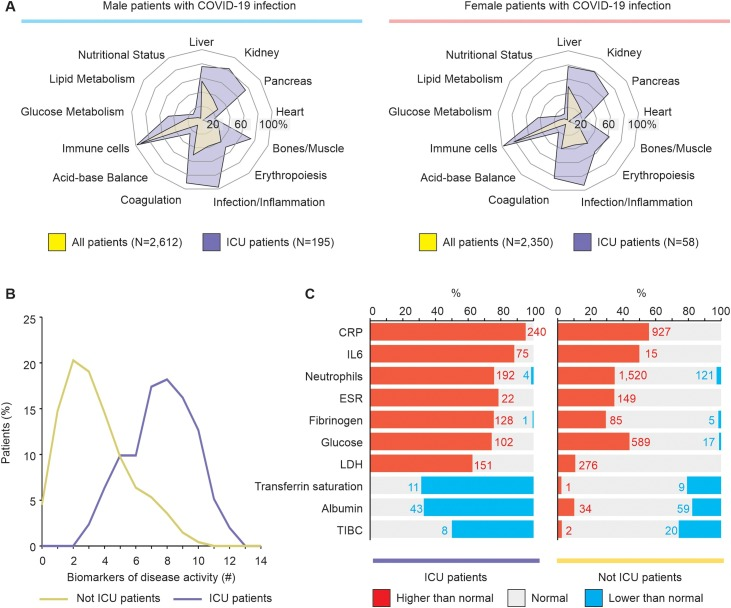In-depth analysis of laboratory parameters reveals the interplay between sex, age, and systemic inflammation in individuals with COVID-19.
The progression and severity of COVID-19 varies significantly in the population. While the hallmarks of SARS-CoV-2 and severe COVID-19 within routine laboratory parameters are emerging, the impact of sex and age on these profiles is still unknown. We performed multidimensional analysis of millions of records of laboratory parameters and diagnostic tests for 178,887 individuals from Brazil, of which 33,266 tested positive for SARS-CoV-2. These included complete blood cell count, electrolytes, metabolites, arterial blood gases, enzymes, hormones, cancer biomarkers, and others. COVID-19 induced similar alterations in laboratory parameters in males and females. CRP and ferritin were increased especially in older men with COVID-19, whereas abnormal liver function tests were common across several age groups, except for young women. Low peripheral blood basophils and eosinophils were more common in the elderly with COVID-19. Both male and female COVID-19 patients admitted to intensive care units displayed alterations in the coagulation system, and higher values of neutrophils, CRP and lactate dehydrogenase. Our study uncovers the laboratory profile of a large cohort of COVID-19 patients that underly discrepancies influenced by aging and biological sex. These profiles directly link COVID-19 disease presentation to an intricate interplay between sex, age and immune activation.
Authors
Felipe Ten-Caten; Patrícia Gonzalez-Dias; Ícaro Castro; Rodrigo L T Ogava; Jeevan Giddaluru; Juan Carlo S Silva; Felipe Martins; André N A Gonçalves; André G Costa-Martins; José D Araujo; Ana Carolina Viegas; Fernando Q Cunha; Sandra Farsky; Fernando A Bozza; Anna S Levin; Pia S Pannaraj; Thushan I de Silva; Paola Minoprio; Fabiano Pinheiro da Silva; Bruno B Andrade; Helder I Nakaya
External link
Publication Year
Publication Journal
Associeted Project
Network & Precision Medicine
Lista de serviços
-
RASL11A, member of a novel small monomeric GTPase gene family, is down-regulated in prostate tumors.RASL11A, member of a novel small monomeric GTPase gene family, is down-regulated in prostate tumors.
-
Splice variants of TLE family genes and up-regulation of a TLE3 isoform in prostate tumors.Splice variants of TLE family genes and up-regulation of a TLE3 isoform in prostate tumors.
-
Concepts on Microarray Design for Genome and Transcriptome AnalysesConcepts on Microarray Design for Genome and Transcriptome Analyses
-
The iron stimulon of Xylella fastidiosa includes genes for type IV pilus and colicin V-like bacteriocins.The iron stimulon of Xylella fastidiosa includes genes for type IV pilus and colicin V-like bacteriocins.
-
Origins of the Xylella fastidiosa prophage-like regions and their impact in genome differentiation.Origins of the Xylella fastidiosa prophage-like regions and their impact in genome differentiation.
-
The role of prophage in plant-pathogenic bacteria.The role of prophage in plant-pathogenic bacteria.
-
Genetic control of immune response and susceptibility to infectious diseases.Genetic control of immune response and susceptibility to infectious diseases.
-
Building capacity for advances in tuberculosis research; proceedings of the third RePORT international meeting.Building capacity for advances in tuberculosis research; proceedings of the third RePORT international meeting.
-
São Paulo School of Advanced Sciences on Vaccines: an overview.São Paulo School of Advanced Sciences on Vaccines: an overview.
-
A reasonable request for true data sharing.A reasonable request for true data sharing.

